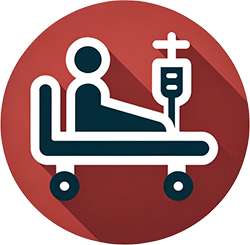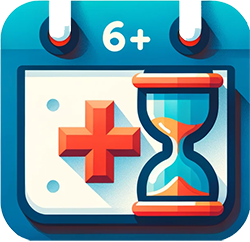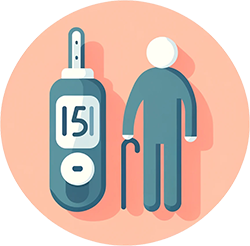How is Cocci managed? Read on to learn about when Cocci is treated and the therapies that are used.

TREATMENTS FOR COCCIDIOIDOMYCOSIS (Cocci)
If you or a loved one has been diagnosed with coccidioidomycosis (Cocci), you may have a number of questions about treatment. You may want to know whether you require treatment at all. And if you do require treatment, what can you expect from treatment? This section addresses treatment for Cocci.
 To Treat or Not to Treat—It’s a Real Question
To Treat or Not to Treat—It’s a Real Question
For mild pulmonary symptoms, you may not need antifungal treatment at all. Two studies looked at patients with mild Valley Fever and compared outcomes for those who received treatment versus those who did not. There was no difference in symptom resolution between the two groups. In fact, the patients who did not receive antifungal therapy returned to full-time work sooner.
The decision to treat is often based on the patient’s symptoms and the doctor’s past experience treating the disease. Doctors who treat a lot of patients or see patients with severe disease may be more aggressive in prescribing antifungals. Because the people who most often get diagnosed have had symptoms longer, some doctors treat the infection more aggressively. Because most people recover without ever knowing they were infected, some doctors prefer to wait and see if the patient gets better on their own.
It is important that patients understand that there are different perspectives on treatment and ensure that healthcare providers listen to their concerns.
This means you may not receive treatment for Valley Fever. But this does not mean you would not need to take some steps to recover. See LIVING WITH COCCIDIOIDOMYCOSIS for recommendations.
Then who should receive treatment? This should be individualized with your healthcare provider, but some of the groups for whom antifungal treatment should be used include:

Patients with severe disease (including hospitalized patients)

Those with symptoms persisting for >six weeks

Those with underlying cellular immune deficiencies

Those who are on certain types of medications that suppress the immune system

People with diabetes or who are frail because of age or comorbidities

People at high risk for dissemination—including people of African or Filipino ancestry
If you do start treatment, it’s important that you continue taking your antifungal medications as prescribed. Some patients have bad or frustrating side effects. If you have side effects, discuss other treatment options with your healthcare provider. Starting and stopping treatments can lead to problems with any disease, including Cocci.
TREATMENT OPTIONS
In this section, we go over the drugs and other treatments that are used to manage Cocci, with a brief discussion of investigational therapies as well.
Drugs
 Below is a list of drugs that are used to manage Cocci. These drugs are arranged in alphabetical order first by drugs taken by mouth and then by drugs that can be given through your vein. Some of these drugs, the ones given by vein, belong to a class called polyenes (named based on their chemical structure), which are the amphotericin B drugs. The other class is azoles, which inhibit a fungal sterol.
Below is a list of drugs that are used to manage Cocci. These drugs are arranged in alphabetical order first by drugs taken by mouth and then by drugs that can be given through your vein. Some of these drugs, the ones given by vein, belong to a class called polyenes (named based on their chemical structure), which are the amphotericin B drugs. The other class is azoles, which inhibit a fungal sterol.
It’s important to note that we provide generalizations about these therapies. Your provider will work with you to determine which agent to start with and which therapy to switch to if necessary. Your provider will consider your medical history and other factors such as kidney function, other medicines you are taking, whether you are pregnant or breastfeeding, in order to select the best therapy for you.
Very few of the drugs discussed here have actually received US Food and Drug Administration (FDA) approval for Cocci. While all of the drugs listed are FDA approved, many were not studied rigorously in clinical trials for Cocci, which is the normal way drugs are tested for approval by the FDA. Many commonly used drugs are prescribed for uses that are not approved for by the FDA; so a lot of the information about how to use them comes from years of experience. Also, for Cocci, there is not a lot of data about how these drugs compare with one another.
 Oral Drugs (Given by Mouth)*
Oral Drugs (Given by Mouth)*
*Some of the drugs listed as oral drugs can also be given intravenously (by vein).
Fluconazole (DIFLUCAN®)
HOW IT IS GIVEN: By mouth, either a tablet or an oral suspension
TYPICAL USE: Fluconazole is the preferred therapy for many types of coccidioidomycosis.
APPROVAL STATUS: Not specifically approved for coccidioidomycosis
HOW WELL IT WORKS: Achieved satisfactory response in 86% of patients with skeletal coccidioidomycosis, 55% of those with chronic pulmonary disease, and 76% of patients with soft-tissue disease. Fluconazole is the preferred therapy because it is well-absorbed and has fewer side effects than itraconazole. It is also relatively inexpensive. However, studies have not established the optimal dose or length of treatment. The dosages of fluconazole used for Cocci are higher than those used for other fungal infections.
SIDE EFFECTS: At Cocci doses, fluconazole can cause hair loss (alopecia), dry skin, chapped lips, and heart rhythm problems
Isavuconazonium sulfate (CRESEMBA®)
HOW IT IS GIVEN: By mouth (capsules) or by vein (IV) only if necessary
APPROVAL STATUS: Not FDA approved for coccidioidomycosis
TYPICAL USE: For patients who are intolerant to or fail treatment with fluconazole (and for Cocci meningitis)
HOW WELL IT WORKS: Has been shown to have efficacy in treating non-CNS involved Cocci and Cocci meningitis patients who failed or could not tolerate other therapies
SIDE EFFECTS: Vomiting, nausea, diarrhea, liver problems, back pain, headache, and leg clots
FINANCIAL RESOURCES: CRESEMBA® Support Solutions. Call 1-800-477-6472 or visit https://astellaspharmasupportsolutions.com/patient/cresemba/
Itraconazole (SPORANOX®, ONMEL®, suba-itraconazole, TOLSURA®)
HOW IT IS GIVEN: By mouth, capsule or oral solution
TYPICAL USE: Itraconazole is usually used as an alternative to fluconazole for pulmonary coccidioidomycosis. It also is effective for disseminated cases, particularly those involving bones and joints
APPROVAL STATUS: Not specifically approved for coccidioidomycosis
HOW WELL IT WORKS: Puts 57% of patients in remission for nonmeningeal coccidioidomycosis. Itraconazole has a worse profile than fluconazole in terms of side effects, absorption, and drug-drug interactions. Need to take the drug with a high-fat meal. SUBA-itraconazole, which improved on these issues, is difficult to obtain.
SIDE EFFECTS: Vomiting, diarrhea, abdominal pain, dizziness, drowsiness, rash, headache, blurred vision, liver damage, joint pain, heart problems, and swelling . More drug interactions with other drugs than with fluconazole
Ketoconazole
HOW IT IS GIVEN: By mouth (NIZORAL®, EXTINA, KETOZOLE, AND XOLEGEL®)
TYPICAL USE: This drug is approved in humans, but it is currently only used by veterinarians in the United States
APPROVAL STATUS: One of the two drugs FDA approved for coccidioidomycosis.
HOW WELL IT WORKS: Rarely used because of negative benefit: risk ratio vs other azoles. Only 20-30% of patients respond to 200 mg to 400 mg (hard to increase the dose because of side effects)
SIDE EFFECTS: Gastrointestinal problems, adrenal problems, gynecomastia
Posaconazole (NOXAFIL®)
HOW IT IS GIVEN: By mouth (delayed-release tablets or an oral suspension) and by vein (IV) only if necessary
APPROVAL STATUS: Not approved for coccidioidomycosis
TYPICAL USE: For patients who have failed or who can’t tolerate fluconazole or other azoles
HOW WELL IT WORKS: In nonmeningeal disseminated or chronic pulmonary coccidioidomycosis, 85% of patients had a satisfactory response.
SIDE EFFECTS: Gastrointestinal side effects, rash, and liver enzyme elevations
FINANCIAL RESOURCES: NOXAFIL® Merck Patient Assistance Program. Call 800-727-5400 or visit https://www.merckhelps.com/NOXAFIL%20TABLETS#:~:text=If%20you%20believe%20that%20you,4%20to%20download%20an%20enrollment
Voriconazole (VFEND®)
HOW IT IS GIVEN: By mouth and by vein (only if absolutely necessary)
APPROVAL STATUS: Not FDA approved for coccidioidomycosis
TYPICAL USE: For severe disease or Cocci meningitis that has not responded to high-dose oral fluconazole
HOW WELL IT WORKS: Some evidence for efficacy for Cocci that has failed other therapies, side effects are a concern.
SIDE EFFECTS: Visual disturbances, nerve problems, liver problems, heart rhythm problems, bone problems, and interactions with other drugs, long-term use: skin sensitivity and skin cancer
 Intravenous (IV) Drugs (Given by Vein)
Intravenous (IV) Drugs (Given by Vein)
Amphotericin B Deoxycholate (conventional amphotericin, FUNGIZONE®), IV
HOW IT IS GIVEN: By vein (intravenous)
APPROVAL STATUS: One of the few drugs that is specifically approved for coccidioidomycosis
TYPICAL USE: Reserved for patients with severe disease; however, most patients who need amphotericin will be treated with a lipid formulation because these formulations have a better safety profile (see ABELCET and AMBISOME below), Amphotericin B deoxycholate can also be used in patients who can’t tolerate azoles or for pregnant women, where there is concern about fetal toxicity of azoles.
HOW WELL IT WORKS: Amphotericin B deoxycholate is considered a gold standard for management of severe coccidioidomycosis.
SIDE EFFECTS: Fever, drop in blood pressure, upset stomach, loss of appetite, vomiting, diarrhea, anemia, kidney damage, and liver damage
Amphotericin B Deoxycholate (conventional amphotericin, FUNGIZONE®), intrathecal
HOW IT IS GIVEN: Through lumbar puncture (described above), Ommaya reservoir, or cisternally
APPROVAL STATUS: Amphotericin B deoxycholate is approved for treatment of coccidioidomycosis, but this is not specific to the intrathecal route
TYPICAL USE: Typically used if multiple courses of high-dose azole therapy do not work for Cocci meningitis
HOW WELL IT WORKS: This is currently one of the therapies that may lead to Cocci meningitis cure after years of dosing.
SIDE EFFECTS: Vomiting, headaches, fevers, nausea, vomiting, slowed heart rate, and neurologic problems (hearing loss, eye problems, gait problems, etc.) but many of these are usually temporary.
Amphotericin B lipid complex (ABLC, ABELCET®), IV
HOW IT IS GIVEN: By vein (intravenous)
APPROVAL STATUS: Not specifically approved for coccidioidomycosis
TYPICAL USE: For patients who have severe disease or who have failed azole therapy
HOW WELL IT WORKS: Effective in managing severe Cocci but with less kidney toxicity than conventional Amphotericin B
SIDE EFFECTS Chills, fever, nausea, vomiting, more kidney problems than liposomal amphoteric B, low red blood cell count
FINANCIAL SUPPORT: Leadient Biosciences Patient Assistance Program: 800-490-3262
Liposomal amphotericin B (AmBisome®)
HOW IT IS GIVEN: Through your vein (intravenous)
APPROVAL STATUS: Not specifically approved for coccidioidomycosis
TYPICAL USE: Reserved for patients with severe disease
HOW WELL IT WORKS: Liposomal amphotericin is as effective as conventional amphotericin but with less kidney issues
SIDE EFFECTS: Abdominal pain, vomiting, diarrhea fever, chills, loss of appetite, headache. Also associated with low potassium, low magnesium levels, anemia
Clinical Trials and Investigational Agents
 Clinical trials are research studies that test how well new treatment approaches work. They have an important place in your care as researchers strive to improve current Cocci treatments and search for new and better ones. Clinical trials are essential for learning about Cocci.
Clinical trials are research studies that test how well new treatment approaches work. They have an important place in your care as researchers strive to improve current Cocci treatments and search for new and better ones. Clinical trials are essential for learning about Cocci.
Our most effective antifungal treatments would not be available without the clinical trial process. Unfortunately, many people with Cocci are unaware of the option for a clinical trial or are unsure about the value of participating.
Your goal is to find the best treatment available whenever you make a treatment decision. While there may be a good standard of care for you—care that experts believe is appropriate for your specific diagnosis and treatment history—sometimes the current standard of care is not as effective as you and your healthcare team would like. Other times, the standard of care works for a time but then stops working. In still other instances, there is no standard of care for your situation. Participation in a clinical trial may be the best option for you.
The best time to search for clinical trials is every time you are faced with a treatment decision.
At the time this website has been developed, these are some promising therapies in development for Cocci:
- Olorofim: This drug belongs to a novel class of drugs called orotomides. In animal models of Cocci meningitis, some of the mice who received olorofim were potentially cured in that they were culture negative. Olorofim has orphan drug status. It has been studied in patients with Cocci in the FORMULA-OLS study, with preliminary positive results in Cocci reported at an infectious diseases meeting in 2022.
- Fosmanogepix, another drug using a unique mechanism of action, is also in development. It has activity against Cocci, but it has only been evaluated in mice.
- Oteseconazole (VT-1161) is a newer azole that is selective for fungal enzymes over human ones. It has performed well in several animal models of Cocci.
- Nikkomycin Z inhibits a key step in the synthesis of the fungal cell wall. It showed promising results in Phase 1 trial, but the clinical trial stalled because of recruitment and funding issues.
- Ibrexafungerp belongs to a new class called the triterpenoid class, This drug interferes with the building of the fungal cell wall. Already FDA-approved for vulvovaginal candidiasis, ibrexafungerp was recently studied in a phase 3 trial for patients with refractory fungal diseases, including those with Cocci meningitis
- Δcps1i is a vaccine for Cocci that is in development. This vaccine was shown effective in protecting dogs against experimentally induced Cocci.
Surgery
 Your doctor may consult a surgeon to manage your Cocci in these special circumstances:
Your doctor may consult a surgeon to manage your Cocci in these special circumstances:
- You have a cavitary pneumonia
- With symptoms that is not responding to antifungal therapy or
- The cavities have been there for 2 years and the symptoms come back when antifungal therapy is stopped
- You require a a chest tube
- You have Cocci in your spine
- You have Cocci meningitis and you have elevated intracranial pressure (which might require putting in a shunt to drain cerebrospinal fluid)
Questions to ask your doctor about treatment for Cocci
- Do I need antifungal therapy?
- If yes, when, and with what medicine?
- How do I take that medication?
- For how long will I have to take that medication?
- How do you know if the medication is working?
- What are the side effects?
- Is this drug covered by insurance? Will you help me with insurance? What is the cost of the medication to me?
- What will we do if it does not work?
- Will I need any other treatments? (e.g., surgery)?
- Do you think I am an appropriate candidate for a clinical trial? Why or why not?
- When do I come back for a follow-up visit?
- Will I be able to work or go to school?
- Can I please have a medical release form from school or work (if appropriate)
![]()
*Throughout these treatment sections, we make references to recommended treatment strategies. In general, many of these discussions were based on Infectious Diseases Society of America guidelines for coccidioidomycosis. The guidelines can be accessed here.

